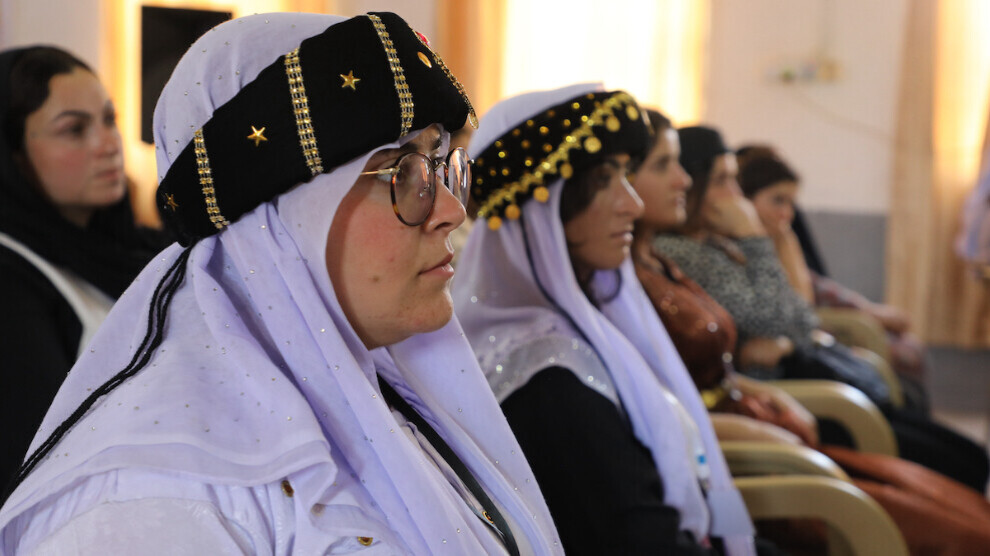Young Women's Union established in Shengal
Establishment of the Shengal Young Women's Union was announced in a congress attended by 150 delegates in Shengal.
Establishment of the Shengal Young Women's Union was announced in a congress attended by 150 delegates in Shengal.

On the 26th anniversary of the self-sacrificing action of PKK guerrilla Zeynep Kınacı (Zilan), young women held a congress in the Yazidi town of Shengal in southern Kurdistan (northern Iraq).
Guests from the Maxmur Refugee Camp also attended the congress alongside 150 delegates.
During the congress, young women announced the establishment of the Shengal Young Women's Union (Yekitiya Jinên Ciwan a Shengalê-YJCŞ).
The congress started with a minute of silence in memory of those who lost their lives during the massacre against the Yazidis, those who lost their lives during ISIS attacks and the martyrs of the Kurdistan freedom struggle.
Young women's spokesperson Sara Botan delivered the opening speech, saying, “We consider Abdullah Öcalan as the architect of this congress. We commemorate Martyr Berivan and Martyr Zilan and reiterate our promise that we will follow in their footsteps. As young women, we can forestall further massacres by organizing ourselves.”
“Family and social structures shaped in the grip of genocides do not regard young women as having free will and subject them to sexism. We, young women, will organize ourselves and fight the mentality that subjects us to genocide and sexism as our destiny. We praise the struggle and resistance of the guerrillas who saved us from the massacre and we consider them as our guides,” she added.
The Yazidi Free Women’s Movement (Tevgera Azadiya Jinên Êzîdxanê, TAJÊ) diplomacy spokesperson Suham Shengalî delivered the second speech of the congress.
“It is important that young Yazidi women attend the congress and organize themselves at a time when invasion attacks against Shengal, Rojava, the free mountains and South Kurdistan have escalated and, at the same time, the joint resistance of the guerrillas and the people have reached its peak. As the TAJÊ, we celebrate the congress. Organizing ourselves is a response to the mentality that has subjected us to massacres throughout history,” Shengalî said.
Members of the Yazidi women's defence forces, the YJŞ, also attended the congress. On behalf of the YJŞ Command, Viyan Hebabi delivered a speech congratulating the congress.
“It is important for us that the congress takes place on the anniversary of comrade Zilan's martyrdom. The response of the Yazidi women by organizing themselves in this way is very meaningful,” Hebabi said.
Several messages were addressed to the congress. Komalên Jinên Ciwan's message underscored the tragedies experienced by Yazidi women and the resistance they developed against them.
Videos conveyed messages from Russia, Armenia, North Kurdistan, Rojava and Europe.
After the messages, Kurdish People's Leader Abdullah Öcalan's remarks on Shengal and the Yazidi community were read out.
Afterwards, the congress activity report was read out and sessions about the situation in Shengal and the struggle of young women were held.
The congress also denounced the 9 October, 2020 agreement hammered out between Hewler (Erbil), Baghdad and Turkey against Shengal and the Turkish attacks.
Furthermore, the organizing principles of young women were discussed. The YJCŞ accepted “patriotism, organization, free thought and will, struggle, ethical and aesthetic values as its main principles” in accordance with the line of Kurdish leader Abdullah Öcalan.
Evaluating the damage caused by sexism against young women, the congress emphasized the need for a more effective struggle against social problems and sexist mentality through the organization of young women.
The congress introduced a road map to struggle against the family and social structures that condemn young women to marriage at a young age, the practices of the post-modern system that commodify women, feudal patterns that deprive women of their right to defend themselves and the mentality that prevents women from educating and developing themselves.
Young women said that they would promote the concept of "self" (xwebûn) both for themselves and for society in order to maintain the moral and political fabric of the community, which is the essence of the Yazidi creed.
The congress later held its final session to determine the program, its statutes and management.